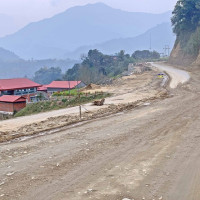- Sunday, 20 July 2025
Wake-up Call For Political Parties
Nepal's republican democracy faced a major shockwave last Friday when thousands of angry protestors hit the streets of the capital, denouncing the federal republic and openly expressing their support for the monarchy, a moribund institution that was overthrown in 2008 following a joint people's movement. This incident highlights that rhetoric on democratic ideals loses its appeal if it fails to deliver welfare and enrich society, making democracy the target of public frustration.
Nepal embarked on the path of republican federal democracy in 2015 with the proclamation of a new constitution drafted by an elected constituent assembly. However, just over nine years later, a serious crack appears to have emerged in a system once hailed as having the people's mandate. Democracy is in crisis worldwide but the challenges are more pronounced in under-developed countries in Asia, Africa and South America. An increasing number of these countries are grappling with instability and systemic failure. Nepal's crisis appears to be part of a broader trend stemming from the breakdown in global values essential for functioning representative systems.
Factors
The current situation has emerged as a result of various factors that are at play globally to weaken democracy and strengthen autocracy. Nepal's democratic transition, too, has never been smooth due to power struggles among and within political parties. Elected political leaders have increasingly shown a tendency to authoritarianism and building consensus among different identity groups has remained a challenge. Democracy thrives on the system of checks and balances but Nepal's political parties have neglected building democratic institutions to ensure oversight over different branches of state. As a result, public trust in democratic processes and institutions has steadily declined.
In a functioning democracy, consensus must be built on certain fundamental values and issues. However, extreme political divisions among parties and leaders within parties have always obstructed building common ground for cooperation. Elections are considered the most important mechanism for refining and strengthening democracy. However, elections in underdeveloped countries, including, of course, Nepal, are rarely free and fair. Electoral malpractices like gerrymandering, vote buying, intimidation of voters, restricting voter turnout and foreign interference have collectively hindered true reflection of popular will.
Similarly, the distribution of candidacy tickets based on loyalty rather than popularity in the constituencies has led to the election of leaders of mediocre quality. Another significant factor contributing to democratic deficiency is the lack of good governance characterised by weakening rule of law, rampant corruption and politicisation of the judiciary. This has resulted in selective justice and government agencies turning a blind eye to irregularities and malfeasance, further eroding public trust in democratic institutions.
The spread of fake information and propaganda is also a contributing factor to democratic decline. Independent journalism – based on fact and investigative reporting - has succumbed to political power and corporate business. Instead, the algorithm-driven social media is dominating the information universe and reinforcing biases, making it difficult to find unbiased news and fact-based information. The way the social media incited the protestors and provoked the opposition to elected government serves as a clear example of how inflammable and misleading information stigmatises democratic culture.
Democracy is not merely a theoretical concept; it is also a political mechanism to deliver public service and foster public welfare in society. It is not only a right to elect and to get elected. It is a tool for empowering people, ensuring equality among different castes, cultures, religions and ethnic identities. However, widening economic disparity, lack of equal access to resources and the increasing role of money in elections have made proportional representation of the above constituents increasingly difficult to achieve. Growing dominance of corporate and elite sections of the society has weakened accountability, encouraged impunity and rewarded malfeasance.
As a result, citizens are feeling left out from the economic opportunity. This sense of marginalisation has driven young people either toward foreign employment or to radical political movements - a fact that is conveniently ignored by political power. The culture of majoritarianism and the suppression of minority voices, rather than accommodating them, have contributed to the unpopularity and alienation of the democratic experiment in less than a decade. Policy matters are no longer issues of meaningful public discourse, leaving people powerless to influence the policy-making process. Consequently, there is public apathy toward democratic participation and offering constructive feedbacks both within party structures and across broad areas of governance.
The regression of democracy to authoritarianism is a global phenomenon. This erosion has weakened the international democratic movement, as even nations once considered as the torch bearers of democratic movement are now apathetic toward the democratic crisis faced by under-developed young democracies. This indifference has given space for authoritarian powers to expand their influence, further challenging the ideals of democratic governance. The distrust on the commitment of democratic political parties and the competence of elected governments to deliver good governance emanates from the undemocratic inner-party cultures that are pervasive across all parties- whether leftist, rightists, centrists or monarchist. No political issues or agendas are subjected to discussion before formulating policies to address them.
Accountability
Moreover, decisions are imposed from the top down, coercing local committees to implement decisions regardless of their practicality and relevance. Higher-level party functionaries are seldom held accountable through the process of criticism and self-reflection. Differences are treated as opposition and party members who express dissenting views are suspended, demoted or expelled. The number of leaders and organised members of three major political parties expelled, sidelined or forced to leave the party in the past three decades is so significant that their combined population might have surpassed that of the active members and supporters remaining in the mainstream.
The mass of protestors who chanted pro-monarchy slogans reflects the scale of isolation of mainstream democratic and leftist parties from their support base. While people recognize that monarchy is an outdated institution, their resort to it reflects their desperation rather than a genuine shift in loyalty to the regressive system. Disillusioned by the present political system, they are signaling their desperation instead of advocating for the return of monarchy. This should, however, serve as a wake-up call for political parties. If they wish to regain legitimacy, they must commit to the genuine democratisation of entire party organisations and government bodies, ensuring that leading positions at all levels are filled with principled, dedicated and meritorious individuals rather than by those who rise through flattery and favouritism.
(Dr. Bharadwaj is a former ambassador and former chairperson of Gorkhapatra Corporation.@gmail.com.)

















